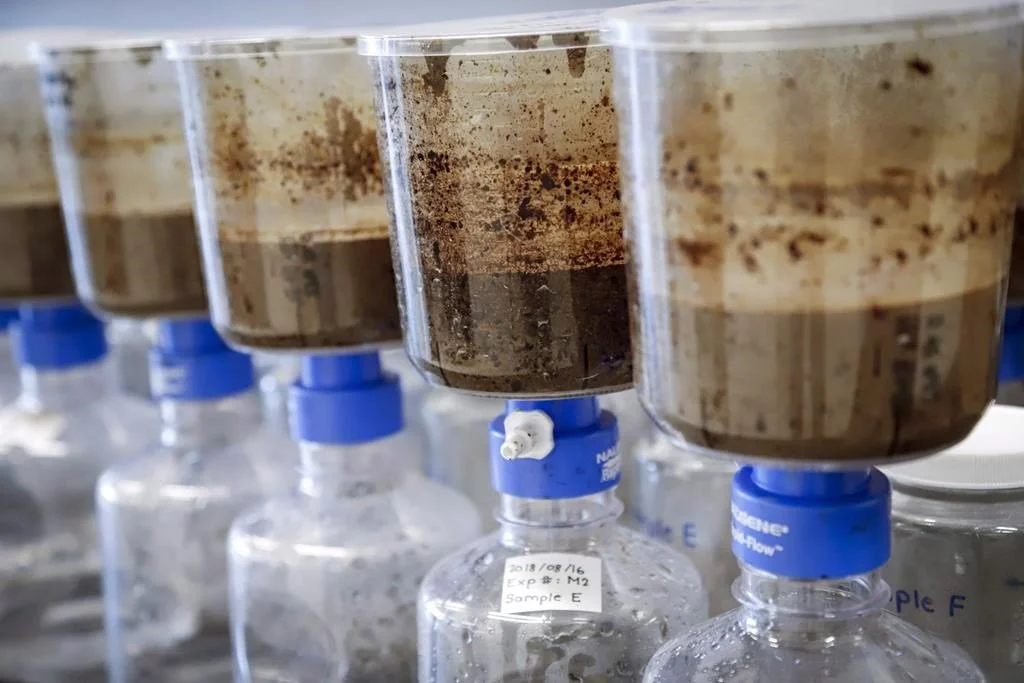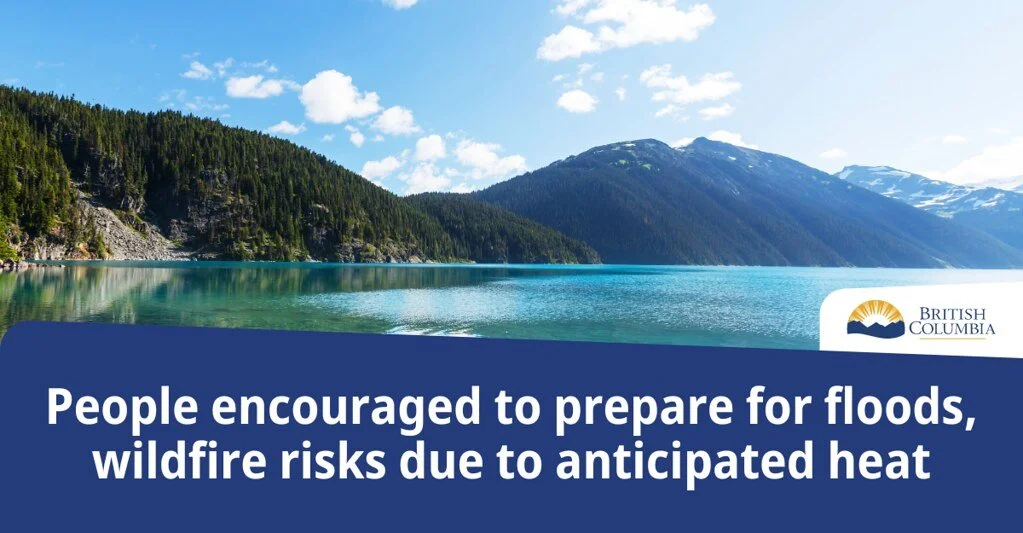The research coming out of Global Water Futures (GWF) is being presented at an open science meeting over three days from May 15–17, and will highlight some of the best science and knowledge addressing solutions for Canada’s water futures, including advancements in the forecasting and modelling of snow, glaciers, water quality, soil moisture, floods and droughts, in monitoring of water quality, in detection of the COVID-19 virus in community wastewater, in Indigenous co-creation of knowledge, and in how national and international policies could achieve water sustainability.
After early heat, experts say Prairies to face climate challenges in season ahead
Much of Alberta and Saskatchewan relies on water from melting snow in the Rocky Mountains for replenishment of waterways in the summer. But John Pomeroy — director of the University of Saskatchewan's Coldwater Laboratory in Canmore, Alta. — told CBC that this past winter provided one of the lowest snowpacks he's seen. The snow also melted about six weeks earlier than anticipated, fuelled by the unseasonably warm weather.
Yukon's Minto Mine ceases operations, territory steps in to secure site
Streicker says the priority is to ensure that the site is secure, and that water treatment continues. He said the territorial government immediately hired a contractor who then had the water treatment facilities back up and running "basically within 24 hours." "The team has moved very quickly and the reports I'm getting are that things are in hand," Streicker said Monday morning.
Pipeline plot twist: where Line 5 threatens nature, now nature is a threat to Line 5
The controversial Canada-U.S. oil and gas conduit known as Line 5 could be facing its toughest challenger yet: the very watershed the pipeline's detractors are trying to protect. Spring flooding has washed away significant portions of the riverbank where Line 5 intersects Wisconsin's Bad River, a meandering, 120-kilometre course through Indigenous territory that feeds Lake Superior and a complex network of ecologically delicate wetlands.
The heat may come, but backyard pools won't be refilled in northeastern Spain this summer
Water management is becoming a hot topic as Spain gears up for regional and municipal elections this month and a national vote later in the year, as farmers and other industries vie for an increasingly scarce resource. Spain has one swimming pool for every 37 residents, and these, too, are now in the spotlight. In Vacarisses, a scattered town of more than a dozen subdivisions with views of the Montserrat mountain range, residents are bracing for another difficult summer after enduring 16-hour water cuts last year when aquifers ran dry.
Back to top Kootenay resident’s work in water protection wins two BC Achievement Awards
“I have been privileged enough to find a path of work in environmental and water stewardship. This work has been deeply rewarding despite the overwhelming sense of urgency to address the climate and the biodiversity crises we have put ourselves in.” The annual BC Achievement Community Awards recognize extraordinary British Columbians who build better, stronger and more resilient communities. The Mitchell Award of Distinction recognizes one individual in particular who demonstrates “an unwavering commitment to elevating people around them”. Hartwig’s lifelong work in environmental conservation, and her selfless leadership style that empowers others to lead and excel, was the rationale provided by the BC Achievement Foundation for singling out Hartwig as this year’s Mitchell Award designate.
Imperial Oil faces more water problems at Kearl oilsands mine, regulator warns
The Alberta Energy Regulator has warned Imperial Oil about more wastewater problems at its Kearl oilsands mine in northern Alberta. The regulator has issued a notice of non-compliance to the company after chemicals associated with oilsands tailings were found at an off-site well at levels that exceed provincial guidelines.
Here's a snapshot of some of Canada's salty waterways harming ecosystems
A number of Canadian cities have exceeded acceptable chloride levels in watersheds in recent years, raising concerns about the impact on freshwater wildlife and other species. The problem largely stems from road salt and saline solutions, which have a chemical compound of chloride to keep roadways safe during winter weather.
Nova Scotia farmers worried about water use amid dry spring
A Nova Scotia farming group is concerned about the amount of water being used for agriculture this spring, but a provincial hydrologist says underground water levels are normal for this time of year. The current conditions have prompted Agriculture Canada to classify much of Nova Scotia as "abnormally dry," and categorize Truro and part of the Annapolis Valley as having a moderate drought. "It's getting to a point now where things are really drying out," said Allan Melvin, a sixth-generation farmer from the Annapolis Valley and president of the Nova Scotia Federation of Agriculture.
Atikokan, Ont., declares state of emergency following culvert failure
A state of emergency has been declared in the northwestern Ontario town of Atikokan following the failure of a culvert on a major roadway. The culvert failure led to a 15-metre section of Mercury Avenue being washed out, the town said in a news release late Thursday afternoon. The washout also disrupted a water main that runs along Mercury Avenue, which has led to a drop in water pressure across the town. A boil-water advisory has also been issued. "I did not take the decision to declare a state of emergency lightly, and after considerable deliberation with our Municipal Emergency Control Group, it became obvious that this is the correct decision," Atikokan Mayor Rob Ferguson said in a statement.
People encouraged to prepare for floods, wildfire risks due to anticipated heat
The forecast heat is expected to accelerate the snowmelt at higher elevations, which will increase pressure on the province’s rivers and streams. The River Forecast Centre is monitoring weather patterns and river conditions, and the River Forecast Centre website has updated flood warning and advisory notifications, including a map of areas of heightened flood risk. The RFC is forecasting increasing flooding hazards in the B.C. Interior over the weekend and through next week due to rapid snowmelt. Key areas of concern include the Fraser River from Prince George through the Fraser Canyon, Cariboo Mountains, North Thompson, South Thompson, Shuswap, Similkameen, Kootenay and Skeena regions.
University of Saskatchewan teams up with Saskatoon to trap, analyze trash headed for river
The City of Saskatoon has partnered with the University of Saskatchewan for a pilot project aimed at better understanding the debris and pollution that gets into the South Saskatchewan River. Litter and pollutants enter storm drains on city roads and streets, travelling underground and eventually ending up in the river. Saskatoon Water director Russ Munro said the project will use trash traps to apprehend the debris.
Algae blooms behind Regina and Moose Jaw's musty water: Buffalo Pound water treatment plant
Early algae blooms are to blame for the musty water some people are noticing in Regina and Moose Jaw these days, according to experts at the Buffalo Pound water treatment plant, which services both cities. Blair Kardash, the plant's manager of laboratory and research, told CBC News his team first detected the "odour materials" from the growing algae in Buffalo Pound Lake — where the water comes from before it's filtered — at the end of April.
Quebec City is enforcing tighter water restrictions
"The challenge is not necessarily our water sources, but rather our ability to produce and deliver it, " said Marie-Josée Asselin, vice-president of the city's executive committee. "When everyone consumes water at the same time, this is when we put ourselves at risk in terms of distribution and production." Quebec City found that watering lawns has put the most pressure on its drinking water tanks in dry weather.
Boil water advisory issued for city of Thompson, Man.
People in the northern Manitoba city of Thompson are being told to boil their water after routine testing revealed a failure in the filtration process. The failure has allowed poorly treated water to enter the distribution system, says a notice posted May 10 by Manitoba Health. Water must be boiled for at least one minute before using it for consumption, which includes drinking, making ice, preparing food or baby formula, washing vegetables and brushing teeth, the advisory says.
Anaergia takes home big wins at 2023 Global Water Awards
Burlington, Ont.-based Anaergia Inc. has been named Net Zero Carbon Champion in the water industry’s most prestigious awards program, the Global Water Awards. In addition, a wastewater project designed, built, and financed through the company’s subsidiary SoCal Biomethane for Victor Valley Wastewater Reclamation Authority was named Wastewater Project of the Year.
At last, a federal water agency
Terry Duguid, Liberal member of Parliament for Winnipeg South, was given the task of turning the notion into reality, a fairly straightforward assignment given the unusual clarity of the promise; at least one would think. Ottawa is spending billions of dollars on water-related programs scattered among more than a dozen departments with co-ordination and common direction lacking for all but a few of these. The guiding policy — federal water policy — was crafted in 1987 and has been a dead letter for at least a couple of decades. An academic study of federal water expenditures conducted in 2020 found it impossible to determine from public records exactly how much Ottawa was spending on water and for what specific purposes.
Saint John dropped from national COVID-19 wastewater monitoring site over data accuracy concerns
Saint John has been temporarily removed from the national COVID-19 wastewater surveillance dashboard over concerns about the accuracy of its data. Public Health Agency of Canada officials believe "the sampling point and treatment of the sample prior to testing was the origin of the test variance," said spokesperson Anna Maddison. This suggests "the reported values are not reflective of the community burden," said spokesperson Nicholas Janveau.
Ontario man works to remove 'sea of goldfish' from natural wetland
Exploding goldfish populations that can successfully survive the winter are wreaking havoc on native fish species across the country, in suburban storm water ponds, in lakes and other waterways. Researchers in B.C. recently warned the invasive fish is moving in schools the size of football fields and spreading from Vancouver to other parts of B.C.
This N.B. town has had chronic flooding problems. A solution is finally getting closer
A years-long effort to address chronic flooding in Tantramar is a step closer to completion. The southeastern New Brunswick town, which includes Sackville, started work on a multi-phase flood mitigation project in 2017. It involves upgraded drainage systems, a series of holding ponds and an upgraded aboiteau that discharges the water into the tidal Tantramar River. The aboiteau allows water to go out, but not flow back in.





















